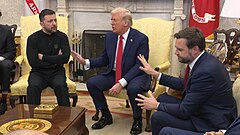
Trump vs. Zelenskyy Disputes: Political Tensions and International Impact
Introduction
The relationship between former U.S. President Donald Trump and Ukrainian President Volodymyr Zelenskyy has been marked by controversy, political maneuvering, and global implications. Their disputes, primarily revolving around the 2019 impeachment inquiry into Trump and differing perspectives on U.S.-Ukraine relations, have significantly influenced international politics. This document explores the key disputes between Trump and Zelenskyy, their consequences, and the broader geopolitical impact.
1. The 2019 Impeachment Inquiry and the “Quid Pro Quo” Allegations
One of the most significant disputes between Trump and Zelenskyy occurred in 2019, when a whistleblower complaint revealed that Trump had allegedly pressured Zelenskyy to investigate Joe Biden and his son, Hunter Biden. The controversy stemmed from a July 25, 2019, phone call between the two leaders.
- Trump’s Request for an Investigation: Trump reportedly asked Zelenskyy to open an investigation into Hunter Biden’s business dealings in Ukraine, specifically his association with Burisma Holdings, a Ukrainian gas company. Trump implied that U.S. military aid to Ukraine could be contingent on Zelenskyy fulfilling this request.
- The Role of Military Aid: At the time, the U.S. had approved nearly $400 million in military assistance to Ukraine, a crucial support system for the country in its ongoing conflict with Russia. Trump’s alleged withholding of this aid until Ukraine launched an investigation was widely viewed as a “quid pro quo” arrangement.
- Zelenskyy’s Position: Zelenskyy denied any pressure from Trump and maintained that Ukraine had no intention of interfering in U.S. elections. However, reports indicated that Ukrainian officials were concerned about potential repercussions if they failed to comply with Trump’s requests.
2. U.S. Impeachment Proceedings
The controversy led to Trump’s first impeachment in December 2019, when the U.S. House of Representatives charged him with abuse of power and obstruction of Congress.
- House Testimonies: Several U.S. diplomats and officials testified that there was indeed a connection between the release of military aid and Trump’s demand for an investigation.
- Trump’s Defense: Trump and his allies dismissed the allegations, calling them part of a politically motivated “witch hunt.” They argued that his conversation with Zelenskyy was “perfect” and that there was no explicit demand for an investigation.
- Impact on U.S.-Ukraine Relations: The impeachment proceedings placed Ukraine in an uncomfortable position, with Zelenskyy striving to maintain bipartisan support from the U.S. while avoiding getting entangled in American domestic politics.
3. Disagreements Over U.S. Support for Ukraine
Beyond the impeachment inquiry, Trump and Zelenskyy had broader disagreements over the extent of U.S. support for Ukraine.
- Trump’s Skepticism on Ukraine: Trump often expressed doubts about Ukraine’s reliability as a U.S. ally. He echoed Russian narratives about corruption in Ukraine and questioned the necessity of extensive U.S. financial and military aid.
- Zelenskyy’s Efforts for Stronger Ties: Zelenskyy, on the other hand, sought increased U.S. assistance, particularly in response to Russian aggression. He emphasized the need for a strong partnership with Washington to counterbalance Russian influence.
- Cancellation of White House Meeting: Zelenskyy had long sought a formal White House visit to solidify Ukraine’s alliance with the U.S. However, his efforts were largely unsuccessful during Trump’s presidency, further straining relations.
4. Trump’s Controversial Remarks on Ukraine and Russia
Trump’s stance on Ukraine and its conflict with Russia also created tensions with Zelenskyy.
- Trump’s Praise for Putin: Trump often spoke favorably about Russian President Vladimir Putin, sometimes downplaying Russia’s role in the Ukraine conflict. His reluctance to criticize Russian aggression frustrated Zelenskyy and Ukrainian officials.
- Allegations of U.S. Disengagement: During Trump’s presidency, Ukraine’s leadership was concerned about a possible shift in U.S. policy that could weaken its position against Russia. Trump’s push for better relations with Putin raised fears that Ukraine might be sidelined.
- Downplaying Ukraine’s Importance: Trump questioned why the U.S. should be deeply involved in Ukraine’s security concerns, suggesting that European nations should take more responsibility. This perspective contrasted with Zelenskyy’s calls for continued American support.
5. The Aftermath and Continued Political Fallout
Even after Trump left office, the disputes between him and Zelenskyy continued to have lasting effects.
- Trump’s Criticism of U.S. Aid to Ukraine (Post-Presidency): Trump has continued to criticize the Biden administration’s support for Ukraine amid the ongoing Russia-Ukraine war. He has suggested that Ukraine should negotiate with Russia, a stance that clashes with Zelenskyy’s firm opposition to Russian occupation.
- Zelenskyy’s International Standing: Despite the tensions with Trump, Zelenskyy has strengthened Ukraine’s global alliances, particularly with the Biden administration, which has provided substantial military and financial aid to Ukraine.
- Trump’s Influence on Future U.S.-Ukraine Relations: With Trump being a leading contender for the 2024 U.S. presidential election, there are questions about whether his potential return to office could alter U.S. support for Ukraine.
Conclusion
The disputes between Donald Trump and Volodymyr Zelenskyy highlight the complex intersection of U.S. domestic politics and international diplomacy. From the 2019 impeachment inquiry to disagreements over U.S. military aid and foreign policy, their clashes have had significant implications for U.S.-Ukraine relations and global geopolitics. As Ukraine continues to fight against Russian aggression, its leadership remains vigilant about maintaining strong international alliances—regardless of changes in U.S. administrations.
SOURCES 